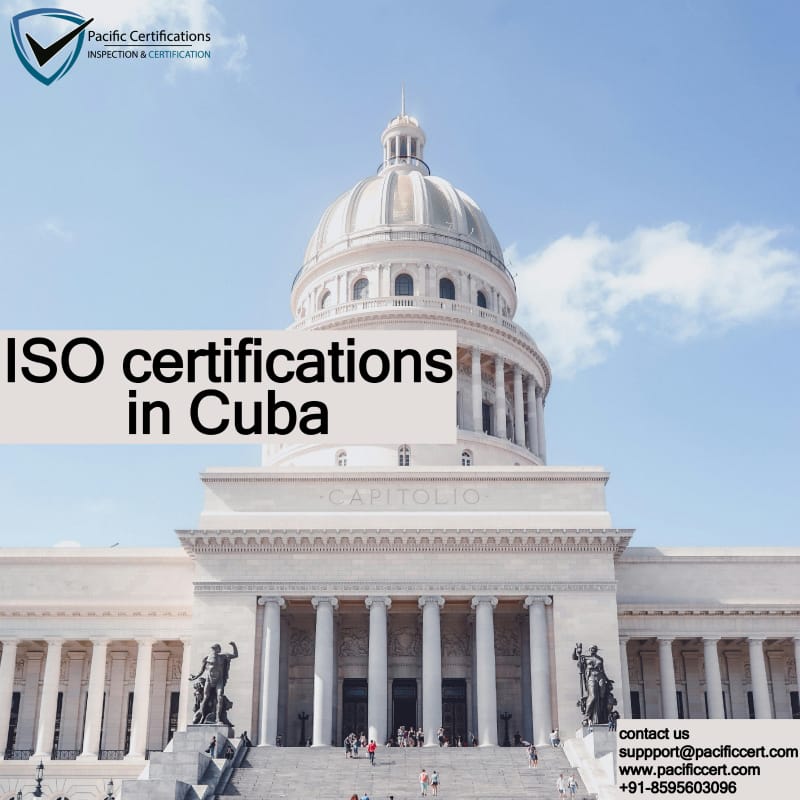ISO Certifications in Cuba, Popular Standards, Requirements and Benefits

Introduction
ISO certifications are a globally recognized set of standards that organizations can be certified against to demonstrate their commitment to industry best practices in areas such as quality management, environmental management, information security, and occupational health and safety, among others. These certifications can be particularly valuable in countries like Cuba, where businesses may be looking to establish credibility and reliability in both domestic and international markets.
ISO Certifications in Cuba
Cuba, with its evolving economic landscape, is increasingly recognizing the value of ISO certifications as a means to enhance business operations, comply with international standards, and improve competitiveness. The most applicable ISO standards for organizations in Cuba include, but are not limited to:
ISO 9001:
Quality Management System (QMS) – Helps organizations ensure they meet customer and other stakeholder needs within statutory and regulatory requirements related to a product or service.
ISO 14001:
Environmental Management System (EMS) – Assists organizations in managing their environmental responsibilities in a systematic manner that contributes to the environmental pillar of sustainability.
ISO 27001:
Information Security Management System (ISMS) – Provides a framework for managing information security risks.
ISO 45001:
Occupational Health and Safety Management System (OHSMS) – Helps organizations improve employee safety, reduce workplace risks and create better, safer working conditions.
ISO/IEC 20000-1:
Information Technology – Service Management – Helps organizations manage the service life cycle, including planning, design, transition, delivery, and improvement of services.
ISO 22000:
Food Safety Management System (FSMS) – Ensures food safety in the supply chain.
Click here to find out more applicable standards to your industry
Requirements of ISO Certifications in Cuba
The requirements for obtaining ISO certifications in Cuba involve a series of steps and adherence to the specific standards an organization is seeking to be certified against. The process is generally consistent with ISO certification processes in other countries, given the international nature of these standards. However, local regulations, market conditions, and specific organizational goals can influence the approach. Here’s a detailed look at the typical requirements and process for obtaining ISO certifications such as ISO 9001, ISO 14001, ISO 27001, and ISO 45001 in Cuba, with an emphasis on how Pacific Certifications can assist organizations through this process.
ISO 9001 (Quality Management System) Requirements
Focuses on meeting customer expectations and delivering customer satisfaction. It requires an organization to establish a quality management system that enhances business efficiency and product quality.
ISO 14001 (Environmental Management System) Requirements
Requires an organization to manage its environmental responsibilities in a systematic manner that contributes to the environmental pillar of sustainability.
ISO 27001 (Information Security Management System) Requirements
Involves establishing, implementing, maintaining, and continuously improving an information security management system (ISMS).
ISO 45001 (Occupational Health and Safety Management System) Requirements
Requires organizations to provide safe and healthy workplaces, prevent work-related injury and ill health, and continually improve OH&S performance.
General Requirements for ISO Certification in Cuba
- Understanding and Documentation: Organizations need to understand the specific requirements of the ISO standard(s) they are seeking certification for. This involves developing and documenting processes, policies, and objectives that meet these requirements.
- Implementation: The organization must implement the documented management system into its daily operations. This includes training employees on the requirements and their roles within the system.
- Internal Audit: Before undergoing the certification audit, an organization should conduct internal audits to assess the effectiveness of its management system and identify areas for improvement.
- Management Review: Management must review the performance of the implemented system and make necessary adjustments to ensure its effectiveness and continuous improvement.
- Corrective Actions: The organization should take corrective actions to address the findings and non-conformities identified during the internal audits and management review.
Benefits of ISO Certifications in Cuba
ISO certifications offer a multitude of benefits to organizations in Cuba, ranging from enhanced operational efficiency to increased marketability and compliance with international standards. These benefits not only support the growth and sustainability of businesses but also help in aligning them with global best practices. Let's explore the key benefits of obtaining ISO certifications in Cuba, and how we at, Pacific Certifications can play a pivotal role in facilitating these advantages.
Enhanced Quality and Efficiency
- Quality Improvement: ISO 9001 certification, for example, focuses on quality management systems that aim to enhance customer satisfaction through the effective application of the system, including processes for improvement and the assurance of conformity to customer and applicable statutory and regulatory requirements.
- Operational Efficiency: Implementing ISO standards encourages organizations to streamline their operations, reduce wastage, and optimize resource usage, leading to cost savings and increased efficiency.
Marketability and Competitive Advantage
- International Recognition: ISO certifications are internationally recognized, signaling to customers and stakeholders that the organization adheres to globally accepted standards of quality and efficiency.
- Competitive Advantage: In a competitive market, ISO certification can be a significant differentiator, showing potential customers that a company is committed to maintaining high standards in its operations and management.
Compliance and Risk Management
- Regulatory Compliance: ISO certifications like ISO 14001 for environmental management can help ensure that organizations meet regulatory requirements, reducing the risk of fines and legal issues.
- Risk Management: Standards such as ISO 27001 for information security management provide frameworks for identifying, assessing, and managing risks, particularly critical in today’s digital age.
Improved Customer Satisfaction
- Customer Confidence: Certification assures customers of the organization's commitment to quality and reliability, fostering trust and customer loyalty.
- Customer Feedback: ISO standards require organizations to focus on customer feedback and continuous improvement, helping to meet customer needs more effectively.
Employee Engagement and Safety
- Workplace Safety: ISO 45001, which focuses on occupational health and safety, helps reduce workplace hazards and ensure a safer working environment, leading to fewer accidents and better employee well-being.
- Employee Engagement: The process of achieving and maintaining ISO certification often involves training and engaging with employees, which can increase their motivation and commitment.
Sustainability
- Environmental Sustainability: By following ISO 14001, organizations can better manage their environmental impact, ensuring sustainability and potentially reducing costs associated with waste management.
How Pacific Certifications Can Enhance These Benefits?
Pacific Certifications, by providing audit and certification services, plays a crucial role in enabling organizations in Cuba to achieve these benefits:
- Expert Guidance: Offering expertise in navigating the complexities of various ISO standards, ensuring that the certification process is smooth and effective.
- Customized Solutions: Tailoring the approach to the unique needs of each organization, ensuring that the ISO standards are implemented in a way that maximizes operational benefits.
- Training and Support: Providing comprehensive training to staff at all levels, ensuring that the organization's culture aligns with the principles of the ISO standards.
- Continuous Improvement: Offering support beyond the initial certification, including regular audits and feedback that help organizations maintain their certifications and continue to improve.
In summary, ISO certifications can significantly impact the operational efficiency, marketability, and overall success of organizations in Cuba. With the support of Pacific Certifications, businesses can navigate the certification process effectively, ensuring that they reap the full range of benefits associated with ISO compliance.
Which industries need ISO Certifications in Cuba?
ISO certifications are versatile and applicable across various industries, providing a framework for organizations to improve their quality, environmental management, information security, and occupational health and safety, among other aspects. In Cuba, as in other countries, certain industries may benefit more prominently from obtaining ISO certifications due to regulatory requirements, market demands, or the nature of their operations. Here’s an overview of key industries in Cuba that particularly benefit from ISO certifications, along with how Pacific Certifications can assist these sectors.
Healthcare
- Relevance of ISO 13485 (Medical Devices — Quality Management Systems) for manufacturers and suppliers of medical devices. It ensures the consistent design, development, production, installation, and delivery of medical devices that are safe for their intended purpose.
- ISO 9001 can also benefit healthcare providers by streamlining their processes and increasing efficiency.
Tourism and Hospitality
- ISO 9001 helps hotels, resorts, and tour operators enhance customer satisfaction through improved service quality.
- ISO 22000 (Food Safety Management) is crucial for restaurants and food service businesses in the hospitality sector, ensuring the safety and quality of food served to tourists and locals alike.
Manufacturing
- ISO 9001 for quality management across various manufacturing sectors, ensuring products meet customer and regulatory requirements.
- ISO 14001 helps manage environmental impacts, an important consideration for manufacturing industries aiming to minimize their environmental footprint and comply with regulations.
Information Technology and Telecommunications
- ISO/IEC 27001 is critical for IT companies, providing a framework for managing information security and protecting data against breaches.
- ISO/IEC 20000-1 (Information Technology — Service Management) helps IT service providers improve their service management system and service delivery.
Agriculture and Food Production
- ISO 22000 is vital for ensuring food safety throughout the food chain, from farms to consumers, critical for both export markets and domestic consumption.
- ISO 14001 can assist agricultural businesses in implementing sustainable practices that minimize environmental impact.
Construction and Engineering
- ISO 9001 helps construction companies ensure that their projects meet both customer expectations and regulatory requirements.
- ISO 45001 is crucial for managing occupational health and safety risks in the potentially hazardous construction industry.
Education
- ISO 21001 (Educational Organizations — Management Systems for Educational Organizations) provides a management tool for educational institutions to improve their processes and respond to students' needs.
Conclusion
By leveraging the expertise of Pacific Certifications, industries in Cuba can navigate the path to ISO certification more efficiently, ensuring that they achieve compliance, enhance their operational effectiveness, and gain a competitive edge in their respective markets.
Pacific Certifications is accredited by ABIS, in case you need support with ISO certification for your business in Cuba, please contact us at [email protected] or +91-8595603096.
Ready to get ISO certified?
Contact Pacific Certifications to begin your certification journey today!
Suggested Certifications –
Read more: Pacific Blogs

